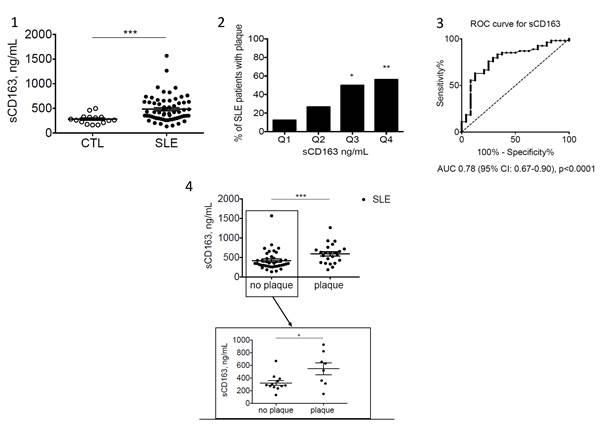Session Information
Date: Sunday, October 21, 2018
Title: Systemic Lupus Erythematosus – Clinical Poster I: Clinical Manifestations and Comorbidity
Session Type: ACR Poster Session A
Session Time: 9:00AM-11:00AM
Background/Purpose: Our study aimed to determine whether sCD163, a soluble macrophage marker upregulated in numerous inflammatory disorders, might be predictive of accelerated atherosclerosis associated with SLE.
Methods: The presence of carotid plaques was prospectively assessed by repeating ultrasound analysis in 63 consecutive SLE patients asymptomatic for cardiovascular disease (CVD) and 18 volunteer health-workers (controls). Ultrasound was performed at baseline and during follow up by a single investigator. Serum level of sCD163 was determined at baseline using ELISA. The primary outcome was the presence of a carotid plaque. Factors associated with carotid plaques were identified through multivariate analysis.
Results: Despite a low risk for cardiovascular events according to Framingham score in both groups (2.1% ± 3.8 in SLE vs 2.1% ± 2.9 in controls; p=0.416), ultrasound study at baseline showed a carotid plaque in 23 (36.5%) SLE patients versus 2 (11.1%) controls (p=0.039). Multivariate analysis showed that SLE status increased the risk for carotid plaque by a factor of 9 (p=0.017). In SLE patients, sCD163 level was high (483.7ng/ml ± 260.8 versus 282.1ng/ml ± 97.5 in controls; p<0.001) and independently associated with carotid plaques as assessed by stratification based on sCD163 quartile values (p=0.009), receiver operating characteristic (ROC) (p=0.001) and multivariate analysis (p=0.015). Eventually, sCD163 at baseline was associated with the onset of carotid plaque during follow up (3±1.4 years) in SLE patients who had no carotid plaque at first evaluation (p=0.041)
Conclusion: Since sCD163 is associated with developing carotid plaque in SLE, it may be a useful biomarker for accelerated atherosclerosis in SLE patients at apparent low risk for CVD
1. Serum level of sCD163 in SLE patients (black rounds) and controls (white rounds).
2. Percentage of SLE patients (black bars) with carotid plaque according to serum level of sCD163 divided by quartile values
3. ROC curves of sCD163 for prediction of carotid plaque in SLE patients. AUC, area under the curve; CI, confident interval
4.Serum level of sCD163 measured at baseline in SLE patients with or without carotid plaque at first vascular assessment (black rounds, top). Serum level of sCD163 measured at baseline in SLE patient who had no carotid plaque (square box) at first assessment and in whom carotid plaque did or did not occur during follow up (black round, bottom).
To cite this abstract in AMA style:
David C, Divard G, Abbas R, Escoubet B, Chauveheid MP, Rouzaud D, Boutten A, Papo T, Dehoux M, Sacre K. Soluble CD163 Is a Biomarker Associated with Accelerated Carotid Atheroma in SLE Patients at Otherwise Low Risk for Cardiovascular Disease [abstract]. Arthritis Rheumatol. 2018; 70 (suppl 9). https://acrabstracts.org/abstract/soluble-cd163-is-a-biomarker-associated-with-accelerated-carotid-atheroma-in-sle-patients-at-otherwise-low-risk-for-cardiovascular-disease/. Accessed .« Back to 2018 ACR/ARHP Annual Meeting
ACR Meeting Abstracts - https://acrabstracts.org/abstract/soluble-cd163-is-a-biomarker-associated-with-accelerated-carotid-atheroma-in-sle-patients-at-otherwise-low-risk-for-cardiovascular-disease/

